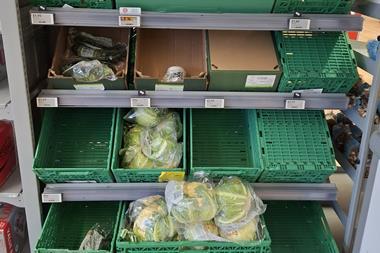Expert at playing to its strengths on social media, Aldi had some fun with April Fool’s Day at the weekend, pranking Twitter followers about a ‘Check Out Duty’ video game.
“Maybe it’s time to prove you can actually beat the checkouts,” it said. And let’s face it, that would not be easy, famed as its staff are for super-speedy scanning.
But customer service is not all about fast workers in Aldi stores these days. There was a time, not so long ago (2018 to be precise), when the supermarket lagged behind others by resisting having any self-service checkouts at all, taking the view that the experience was fast enough without them.
Finally, Aldi took the plunge in a single-store trial in Tamworth in 2019, followed by its then-new Aldi Local stores in London, in a very gradual rollout.
Who are you choosing to start your new career mode? #CheckOutDuty pic.twitter.com/f3XEL2LM57
— Aldi Stores UK (@AldiUK) April 1, 2023
It turns out, Aldi’s adoption of self-checkouts has quietly stepped up a gear or two since then. Though it may not talk about them as much its celebrated workers, self-checkouts have now reached about a third of its estate.
“Self-service checkouts are extremely efficient and have been greeted warmly by customers,” Aldi CEO Giles Hurley told The Grocer this week.
“They’re much more popular than pre-pandemic. People have become almost conditioned with Covid to use them and now we’re rolling them out.
“They’re currently in around 320 stores. In terms of actual units that’s around 2,500. It’s a mix of cash and card machines.”
It’s easy to understand why Aldi may have been hesitant to adopt the technology. Why mess with a formula that’s working so well? And it would naturally rather cater for a trolley of shopping than encourage use of a basket, as self-checkouts might.
Last year, it quietly solved that problem too, with self-checkouts big enough to let shoppers wheel up a trolley and fill big shopping bags, including at its Chellaston store in Derbyshire.
Read more:
-
Rated: the food and drink April Fools’ day pranks for 2023
-
All the April Fools’ Day stunts 2022
-
How grocery celebrated April Fools’ Day 2021
Aldi said at the time the machines were among a number of larger self-checkouts introduced across the country, depending on store size, as it adapted to customers’ differing needs since the early days of its self-service checkout trials. It has not said how many stores have the bigger self-checkouts.
In Chellaston, it meant seven self-checkouts along with five conventional till points.
More new technology
We may see adoption of yet more new technology in Aldi stores too, since “globally we have some other initiatives that we’re trailing”, says Hurley.
Aldi’s first ‘just walk out’ store, which opened in London’s Greenwich last year, was “natural tech to consider”, he says. “We have a unique operating model, with smaller shop floors, leaner overheads, so that technology has the potential to be a game changer, it’s definitely disruptive.
“So it’s very important to engage. It’s fascinating, the tech is excellent, and specifically our trial was on a shop floor that was the biggest in the UK for such technology.
“But it still needs work” and so self-checkouts are the “right next step”, he adds.
Not all shoppers have been welcoming of the bigger self-checkouts, with their arrival in Chellaston provoking the usual arguments on Facebook about convenience versus “taking workers’ jobs”.
Aldi insists the latter is not the case. A spokesman said at the time: “Our self-checkouts offer customers even more choice in how they shop with us and, because all our store colleagues perform a variety of tasks in store, not just serving at checkout, the tills have no impact on the number of people we employ.”
With plans to create 6,000 jobs this year through expansion, comments about jobs being at risk at Aldi are unfounded. But of course, the widespread rollout of self-checkouts – and customers serving themselves – will promise long-term benefits to the discounter as it continues to grow. It turns out it may have found a way to beat its fast workers itself, at least in terms of operational efficiencies.




















No comments yet